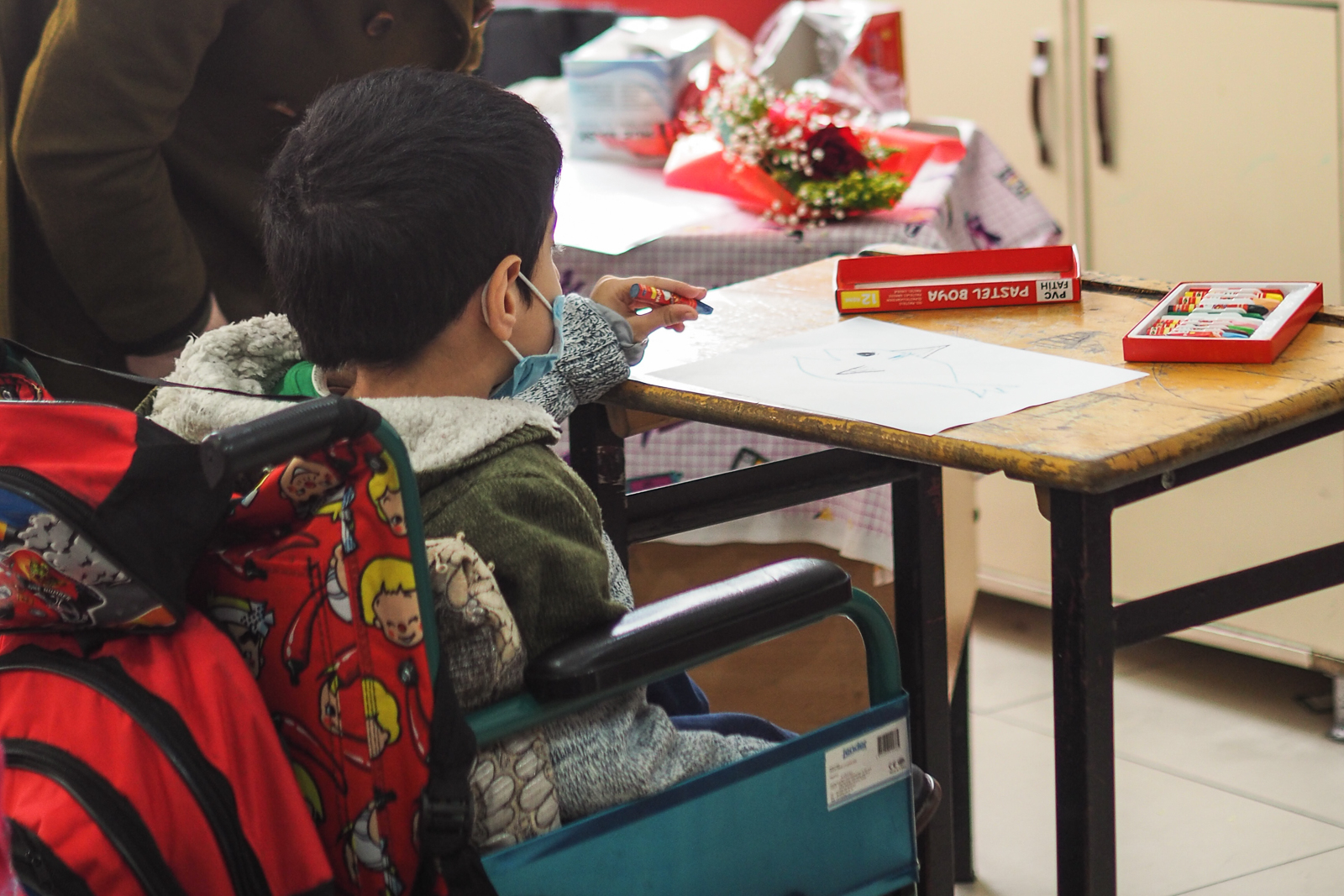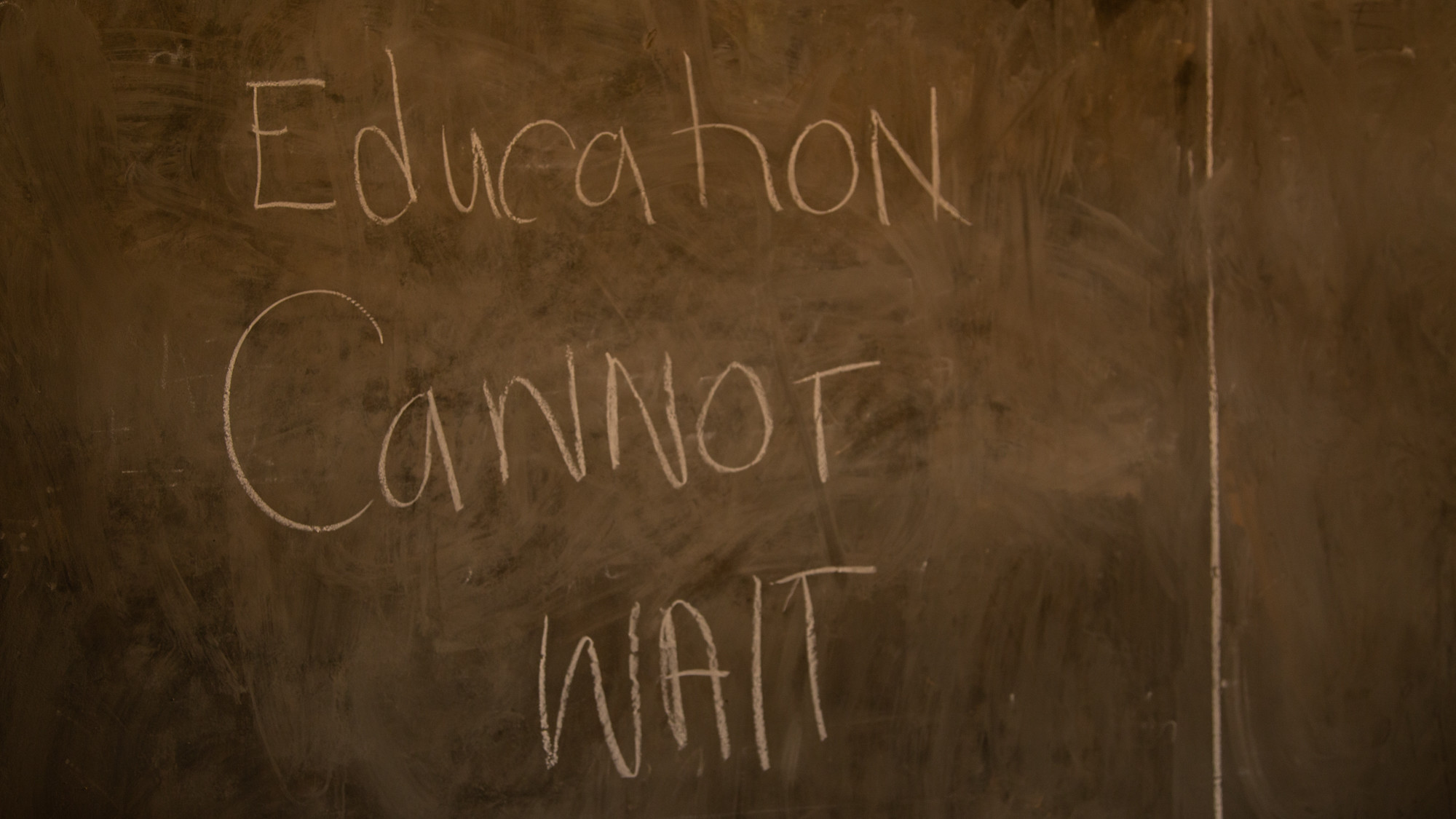
Education Cannot Wait fund

Millions of children in humanitarian emergencies, including conflicts, natural disasters and other crises, miss out on school. This page explains how the Education Cannot Wait fund aims to raise money and support from public and private sources to make sure children in crises can get back into school as quickly as possible.
The need for education in emergencies
Millions of children are deprived of schooling because of crisis situations and emergencies including conflicts, natural disasters and health epidemics. One in four of the world’s school-age children, nearly 500 million, live in countries affected by emergencies and about 75 million children and adolescents are either already missing out on their education, receiving poor quality schooling or at risk of dropping out of school altogether.
When conflict or crisis erupts, the educational needs of children and youth are often the last consideration – an afterthought following food, water, shelter and protection.
Providing education in emergencies is critical. If children are out of school entire generations could be lost to child labour, child marriage, recruitment into fighting or other life-threatening activities. Educating children contributes towards peace-building and rebuilding damaged communities.
What is Education Cannot Wait and how does it work?
The first global fund to prioritise education action in humanitarian emergencies, it was set up after campaigners, youth advocates, education experts and more than 60 leading charities including Theirworld called for a new mechanism and innovative ways to meet the education needs of children caught up in crisis situations.
The Safe Schools petition, with more than 250,000 signatures, was delivered by youth activists to the first World Humanitarian Summit in Istanbul, Turkey, in May 2016. It called on world leaders to immediately commit vital funds to ensure children caught up in conflicts and natural disasters secure an education.
Education Cannot Wait was launched at that summit by the United Nations children’s agency UNICEF with its partners, including the UN Special Envoy for Global Education Gordon Brown, the UN refugee agency UNHCR and governments. A group of world leaders will provide strategic direction.
Education Cannot Wait aims to raise almost $4 billion to provide quality education to more than 13.6 million children and youth over the five years from its 2016 launch – and to reach 75 million children by 2030.
It has five core functions:
- Inspire political commitment so that education is seen by governments and funders as a top priority during crises
- Enable those in the humanitarian (short-term) and development (long-term) sectors to plan, respond and work together with shared objectives
- Generate and disburse additional financing to close the $8.5 billion funding gap needed to reach 75 million children and youth
- Strengthen capacity to respond to crises, including the ability to coordinate emergency support
- Improve accountability, including collecting better data and sharing knowledge of what works and what doesn’t
The Education Cannot Wait fund seeks support from donor countries, the commercial sector, foundations, philanthropists, diasporas and faith-based groups, as well as traditional donors. By bringing together public and private partners, the fund aims to increase funding, encourage innovative approaches to financing and coordinate the provision of education in emergencies.
Why is this specific fund needed?
Despite the biggest refugee crisis since World War II, there has been a drop in funding for education in the poorest and most volatile settings. In 2015 less than 2% of humanitarian aid relief went to education.
A scorecard produced by Theirworld’s A World at School movement showed that in 2015:
- While the funding needed for education in emergencies had risen 21% since 2000, donor funding had fallen by 41%
- Only 12% of children in emergency situations in need of education assistance were being reached.
- Commitments from the top 10 donors to education in emergencies dropped 28% – and six of them decreased their funding by more than 50%
Although humanitarian appeals are one of the best ways to raise money urgently, several countries in crisis do not even have them. And many humanitarian appeals do not include specific funding requests for education.
Support for Education Cannot Wait
The Global Business Coalition for Education committed to mobilising $100 million in financial and relevant in-kind support from the private sector for Education Cannot Wait at its launch in May 2016. GBC-Education will work with Education Cannot Wait to tap into the expertise of private-sector business leaders and companies in developing new solutions to the challenges of education in emergency situations.
GBC-Education has also developed REACT (Rapid Education Action) – the first database to match the private sector to where their help is most needed in a crisis. Examples of how this will work include:
- Education providers supplying text books, teacher organisations mobilising volunteers to supplement teachers and transport companies helping to take students to school
- Companies coming together to fund a top-level team of coordinators to support the UN and host government
- Businesses to contribute money directly to the Education Cannot Wait fund, to be used for research, humanitarian action and recruitment
At the 2017 United Nations General Assembly, Secretary-General Antonio Guterres acknowledged the importance of Education Cannot Wait in reaching 75 million children whose education is disrupted because of conflicts and natural disasters.
The fund’s supporters responded by contributing nearly $30 million in additional investments and taking it to just under the 2017 funding target of $153 million.
How the fund is helping
In its first year, the fund selected 13 countries to benefit from special funding support. It is working to promote access to quality education for 3.4 million children and support 19,000 teachers in Syria, Yemen, Chad, Ethiopia, Central African Republic, Peru, Somalia and Ukraine.
First Emergency Response is also planned in Nepal and Bangladesh and Resilience multi-year programmes in Afghanistan, Uganda and Lebanon.
Useful links
‘Education Cannot Wait’ report: report commissioned by a range of partners and produced by the Overseas Development Institute.
Next resource
